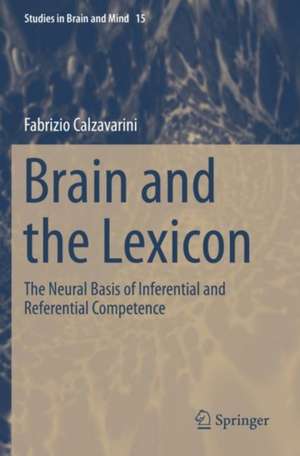Brain and the Lexicon: The Neural Basis of Inferential and Referential Competence: Studies in Brain and Mind, cartea 15
Autor Fabrizio Calzavarinien Limba Engleză Paperback – 26 aug 2021
| Toate formatele și edițiile | Preț | Express |
|---|---|---|
| Paperback (1) | 554.05 lei 38-44 zile | |
| Springer International Publishing – 26 aug 2021 | 554.05 lei 38-44 zile | |
| Hardback (1) | 563.47 lei 38-44 zile | |
| Springer International Publishing – 9 ian 2020 | 563.47 lei 38-44 zile |
Din seria Studies in Brain and Mind
-
 Preț: 391.22 lei
Preț: 391.22 lei - 15%
 Preț: 645.96 lei
Preț: 645.96 lei - 15%
 Preț: 583.61 lei
Preț: 583.61 lei - 24%
 Preț: 686.51 lei
Preț: 686.51 lei - 15%
 Preț: 699.77 lei
Preț: 699.77 lei - 15%
 Preț: 707.96 lei
Preț: 707.96 lei - 15%
 Preț: 645.47 lei
Preț: 645.47 lei - 15%
 Preț: 643.99 lei
Preț: 643.99 lei -
 Preț: 390.08 lei
Preț: 390.08 lei - 15%
 Preț: 578.05 lei
Preț: 578.05 lei - 18%
 Preț: 791.40 lei
Preț: 791.40 lei - 18%
 Preț: 777.03 lei
Preț: 777.03 lei - 15%
 Preț: 646.94 lei
Preț: 646.94 lei - 15%
 Preț: 691.91 lei
Preț: 691.91 lei - 15%
 Preț: 698.80 lei
Preț: 698.80 lei - 15%
 Preț: 641.85 lei
Preț: 641.85 lei - 18%
 Preț: 1118.45 lei
Preț: 1118.45 lei - 15%
 Preț: 639.25 lei
Preț: 639.25 lei - 15%
 Preț: 662.80 lei
Preț: 662.80 lei -
 Preț: 392.21 lei
Preț: 392.21 lei -
 Preț: 394.71 lei
Preț: 394.71 lei -
 Preț: 394.51 lei
Preț: 394.51 lei
Preț: 554.05 lei
Preț vechi: 692.57 lei
-20% Nou
Puncte Express: 831
Preț estimativ în valută:
106.03€ • 110.29$ • 87.53£
106.03€ • 110.29$ • 87.53£
Carte tipărită la comandă
Livrare economică 10-16 aprilie
Preluare comenzi: 021 569.72.76
Specificații
ISBN-13: 9783030275907
ISBN-10: 3030275906
Pagini: 215
Ilustrații: IX, 215 p. 32 illus., 20 illus. in color.
Dimensiuni: 155 x 235 mm
Ediția:1st ed. 2019
Editura: Springer International Publishing
Colecția Springer
Seria Studies in Brain and Mind
Locul publicării:Cham, Switzerland
ISBN-10: 3030275906
Pagini: 215
Ilustrații: IX, 215 p. 32 illus., 20 illus. in color.
Dimensiuni: 155 x 235 mm
Ediția:1st ed. 2019
Editura: Springer International Publishing
Colecția Springer
Seria Studies in Brain and Mind
Locul publicării:Cham, Switzerland
Cuprins
Chapter 1. Formal semantics and the problem of word meaning.- Chapter 2. The structure of inferential competence.- Chapter 3. The structure of referential competence.- Chapter 4. Functional dissociation.- Chapter 5. Anatomical dissociation.- Chapter 6. The neural substrates of inferential and referential competence.- Chapter 7. Inferential and referential competence and the Embodied Framework.- Chapter 8. Dual pictures of semantic cognition?.- Chapter 9 Conclusions.
Notă biografică
Fabrizio Calzavarini is a Post doc Researcher at University of Bergamo, Italy, and is affiliated at with the Center for Logic, Language, and Cognition, Turin, Italy. His research is organized into two interrelated streams. One stream falls at the intersection between the philosophy and neuroscience of semantics, focusing on the neural substrates of lexical competence. The other stream addresses philosophical issues in neuroscience more generally. He is the co-organizer of Neural Mechanisms Online, a series of webinars and web-conferences in the philosophy of neuroscience.
Textul de pe ultima copertă
This monograph offers a novel, neurocognitive theory concerning words and language. It explores the distinction between inferential and referential semantic competence. The former accounts for the relationship of words among themselves, the latter for the relationship of words to the world. The author discusses this distinction at the level of the human brain on both theoretical and neuroscientific grounds. In addition, this investigation considers the relation between the inf/ref neurocognitive theory and other accounts of semantic cognition proposed in the field of neurosemantics, as well as some potential implications of the theory for clinical neuroscience and the philosophy of semantics. Overall, the book offers an important contribution to the debate about lexical semantic competence. It combines a strong philosophical and linguistic background with a comprehensive and critical analysis of neurosemantic literature. Topics discussed lie at the intersection of philosophical semantics, linguistics, neurolinguistics, cognitive science, artificial intelligence, cognitive neuroscience, and clinical psychology. Due to its interdisciplinary orientation, coverage is rich in introductory remarks and not overly technical, therefore it is accessible to non-experts as well.
Caracteristici
Offers a novel, neurocognitive theory of lexical semantic competence Combines neuroscientific analysis with insights from the philosophical and linguistic traditions Sits at the intersection between philosophical semantics, linguistics, neurolinguistics, cognitive science, artificial intelligence, cognitive neuroscience, and clinical psychology
